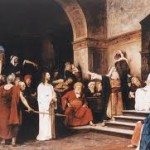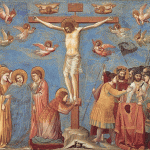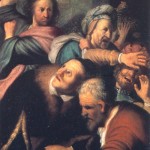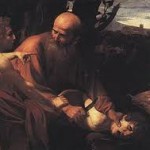Palm/Passion Sunday – Cycle B
Reflecting on Mark 14: 1-15:47
As I stand with the 1.4 billion Christians who will hear Mark’s Passion today I remember again why I love Jesus so much. I love him because he healed, and forgave, and brought forth the kingdom of God. But most of all I love Jesus because there is no suffering that I will ever have that he hasn’t already suffered, no betrayal or terror or agonizing death that he hasn’t also experienced. I love him for that.
I have friends who have been lied to by their family members, cheated out of pensions by their employers, betrayed by their spouses. Just after Jesus agonized in the Garden about the suffering that would soon overtake him, his beloved friend Judas brought a crowd carrying swords and torches into Gethsemane and said, “The one I kiss is the one. Arrest him.” Jesus has redeemed this.
I’ve read of mothers who have watched their children die painfully. I’ve seen my sweet husband stand, weeping, in front of the Pieta in St. Peter’s Basilica, crying with Mary as she held her crucified Son in her arms. Jesus has redeemed this.
Last week my brave friend Margie dealt with the unending pain of her chronic illness. My gentle friend Karen stood grieving at the grave of her father. My gracious friends Eileen and Mike suffered through the terrors of Mike’s surgery to remove a brain tumor. My brave friends Mary Ellen and Dorothy and Eric faced another day with a terminal illness. Jesus knows their pain, their fear, their suffering. By his cross he has redeemed all of our terrors, our agonies, our sleepless, anxious nights. He doesn’t know of them. He knows them.
Oh, Jesus. We love you for that.
What particular part of Jesus’ Passion can you most understand?
What would YOU like to say about this question, or today’s readings, or any of the columns from the past year? The sacred conversations are setting a Pentecost fire! Register here today and join the conversation.
I have come to light a fire on the earth; how I wish it were already burning (Lk.12:49).





